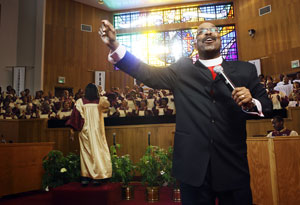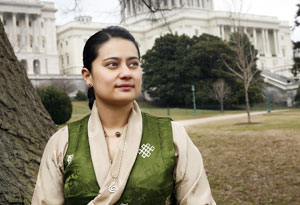
Photo: Ben Baker
Rev. Canon Sally Bingham is an Episcopal priest who preaches energy conservation to people of all faiths. Read the first in O's series on a global contingent of eco-conscious faith leaders joining forces.
Windsor Castle, the bucolic weekend retreat of Britain's Queen Elizabeth II and her pack of corgis, has witnessed the plague, beheadings, and centuries of state dinners, but it's surely never seen this: a procession of bearded Sikhs in orange turbans, bald Buddhist monks in habits, Jews in top hats and prayer shawls, Japanese Shintos in white jôes—even a Greek Orthodox archbishop in a black kamilafki hat and floor-length cassock. On an unseasonably warm day last November, a group of British schoolchildren led this diverse troop from the small town of Windsor through the castle's Hogwart's-worthy gate for a vegan feast of stuffed mushrooms and parsnips. It was all part of "Many Heavens, One Earth," an event organized by the United Nations and the Alliance of Religions and Conservation (ARC), designed to promote environmental evangelism among people of faith—the largest international gathering of its kind. To some, the term religious environmentalist might sound curiously newfangled. Yet most global faiths preach that the planet was divinely created, even if few have been at the vanguard of the movement to protect it from unholy exploitation. Given the politically charged UN climate talks in December, gatherings like this one are likely to become even more important—possibly the basis for a new grassroots environmental movement.
Among the initiatives announced at the event: Chinese Taoists pledged to reduce their use of incense, the Evangelical Presbyterian Church of Ghana hopes to plant 200,000 seedlings, Muslims aim to print the Qur'an on sustainable materials, and the Jewish Climate Change Campaign wants to halve collective meat consumption in five years. By the time a Baptist choir from Baltimore took the stage for a rousing rendition of "All Creatures of Our God and King," prompting the multilingual congregation to leap to its feet and cry out for an encore, all things seemed possible.
As UN Secretary-General Ban Ki-moon reminded the crowd of 200, faith leaders have the ear—and the hearts—of billions (85 percent of the Earth's population identifies with a religion). "You can, and do, inspire people to change," he said. First, the rev. Canon Sally Bingham (above), an Episcopal priest who preaches energy conservation to people of all faiths, and is the founder and president of the Regeneration Project, whose mission is to deepen the connection between ecology and religion:
Her eco aha! moment: More than 20 years ago, the then 45-year-old stay-at-home mom found herself wondering why the Episcopal clergy didn't preach environmental stewardship. "It seemed like there was a lot of hypocrisy," recalls Bingham. "In the Book of Common Prayer, we pray for reverence for the Earth, but then I would see people throwing trash out the windows of their cars. If the people in the pews who profess a love for God's creation are not protecting it, how can we expect anyone else to?" A reverend at Bingham's church in San Francisco suggested she enroll in seminary to explore these questions; after first completing her undergraduate degree at the University of San Francisco, she did just that. She was ordained as a priest in 1997.
Her work: So far, 10,000 congregations in 30 states have joined the Regeneration Project's Interfaith Power and Light campaign, which Bingham launched in 1998 to help fight global warming. Member churches pledge to reduce their energy consumption by installing energy-efficient lightbulbs and appliances and utilizing technologies like solar power. More important, they commit to educating their flocks. "The congregations serve as examples to the members of their communities," says Bingham.
What's next: Last year Bingham kicked off a new program, Carbon Covenant, which helps members of Interfaith Power and Light support the environmental initiatives of religious communities in the developing world. For example, a group of nuns in Minnesota recently raised $10,000 to help an Evangelical Lutheran church in Tanzania reforest several acres on Mount Kilimanjaro.

Photo: Ben Baker
Bishop Walter Thomas is the pastor of New Psalmist Baptist Church in Baltimore, a largely African-American congregation of more than 7,000 that is working to increase awareness of water and sanitation issues in Africa.
His eco aha! moment: "In 2005 a group of church leaders from New Psalmist was invited to accompany Dallas megachurch pastor Bishop T.D. Jakes to Kenya. We went to a community called Mbagathi, where everyone cooked, washed their clothes, bathed, and drank all from the same stream. Then we went to a slum outside Nairobi where a million people live without clean running water. We heard about the high rates of infectious diseases like cholera, about girls who couldn't go to school because they had no way of managing their feminine hygiene. We saw the looks in children's eyes that said, Can you help us? We learned how polluting a stream can destroy whole communities—their ability to harvest crops, to stay alive. We saw the hope that something as small as a well could bring."His work: After the trip to Kenya, Bishop Thomas and his congregants partnered with a school and a network of churches in Africa—he estimates their combined reach is 10,000 people—to provide educational supplies and menstrual hygiene kits for students. In 2006 New Psalmist sent representatives to the World Water Forum in Mexico City, which aims to curb water pollution and ease water shortages around the globe. They are now working with the ARC to raise awareness of water and hygiene issues among other religious groups. "We want to make sure those concerns are not somehow lost in the shuffle," he says.
What's next: New Psalmist's latest project will be to promote Peepoo bags, a promising solution for the 40 percent of people worldwide who lack access to toilets. The bags' lining enzymatically breaks down waste, inactivating disease-causing bacteria and parasites and turning the waste into biodegradable fertilizer.
What keeps him motivated: "Genesis says to go forward and subdue the Earth—not destroy the Earth but bring it into harmony so that it can create even more for you. So many of us have been concerned about self-preservation that we haven't had the opportunity to look more broadly at world preservation. And now we are."

Photo: Ben Baker
Buddhist Dekila Chungyalpa founded the World Wildlife Fund Sacred Earth program. The group works with religious leaders in Asia on environmental initiatives such as the conservation of tigers, whose numbers in the wild have dwindled to 3,200.
Her eco aha! moment: "I was born in Sikkim, a tiny state in India, in the Himalayas. As a child, I'd go into the forest to forage for chestnuts, but I was always distracted by the wildlife around me. Once, I saw a red panda—they're very rare, and very lazy—up in the trees. Another time, from across the river, I saw a mother bear and her two little black cubs. From a young age, it was obvious to me that all life on Earth is sacred."Her work: Chungyalpa is encouraging religious leaders in the so-called Tiger States (countries where the world's remaining tigers live) to speak out on behalf of the animals.
"There's a reverence for life in Buddhism and Hinduism, but it's hard to fight the commercialism around wildlife," she says. In China, for example, delicacies like tiger penis soup, thought to increase virility, sell for hundreds of dollars, meaning local Himalayan communities often have much more to gain from aiding the poachers than from protecting the tigers. Chungyalpa is working to provide alternative income sources, such as ecotourism.
What's next: Chungyalpa recently persuaded Cambodian Buddhist monks to patrol the banks of the Mekong River to help protect the endangered Mekong dolphin, whose numbers have fallen below 100 as a result of the use of illegal gill nets.

Photo: Ben Baker
Devout Jew and foodie Nigel Savage is the founder of Hazon (Hebrew for "vision"), a Jewish nonprofit based in New York City that runs the largest faith-based community-supported agriculture program, or CSA, in the country. The group pairs synagogues with nearby farmers to provide locally grown food for more than 4,000 families, and donates any leftovers to the poor—this year it expects to give away 30,000 pounds' worth.
His eco aha! moment: "My first career was as a fund manager at Rothschild, a bank in London. In the mid-'90s, I took a year's sabbatical to work in Israel, and a friend invited me on a 31-mile hike from the Mediterranean to the Sea of Galilee. I had come from a nerdy, intellectual wing of the English Jewish community, and that was the first instance when I had spent any great amount of time outdoors. I started to think about our obligation to the physical world through a religious prism—about the way that religious environmentalism was capable of not only creating a better world but also rejuvenating religious communities." His work: Hazon is putting Jewish purchasing power behind local organic farms, while helping CSA members reexamine ancient traditions in the context of the modern world. Says Savage: "For 3,000 years, we've asked, 'Is this food fit for me to eat?' The word kosher literally means 'fit.' And in creating a Jewish CSA, we wanted to devise a mechanism for people to start to ask that question in a different way for the 21st century. For instance, I only eat eggs that come from hens that have not been stuck in an eight-by-eight-inch cage. For me, that's what keeping kosher means."
What's next: Last year Hazon helped launch the Jewish Climate Change Campaign to promote radical shifts in synagogues' eco-practices by 2015. "What would it mean to put a bike rack in every synagogue in the world? What would it mean to change food policy in every synagogue so we're not serving industrialized food?" Savage asks. "It's those sorts of questions that we want to put on people's agendas."
What keeps him motivated: "One of the powers of religion is that it offers a long perspective. Historically, the Jewish people have faced down challenges just as daunting as climate change, and we've never, ever lost hope. We've never lost the determination to roll up our sleeves and make a better Jewish community and a better world."
Do you know the real impact of what you buy? Why author Daniel Goleman says it could change everything




